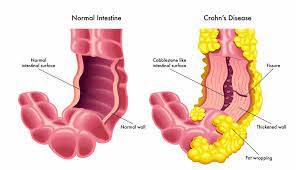Guide to Preventing Crohn's Disease: Strategies and Insights
Introduction
Crohn's Disease is a chronic inflammatory condition of the digestive tract that can significantly affect an individual's quality of life. While there is no definitive cure for Crohn's Disease, there are several strategies that may help reduce the risk of developing this condition or alleviate its symptoms. In this comprehensive guide, we will explore various preventive measures, lifestyle modifications, dietary interventions, and other factors that can potentially lower the risk of Crohn's Disease.
Understanding Crohn's Disease
Before delving into preventive measures, it's essential to understand what Crohn's Disease is and how it affects the body. Crohn's Disease is a type of inflammatory bowel disease (IBD) characterized by chronic inflammation of the gastrointestinal tract. It can affect any part of the digestive system, from the mouth to the anus, but most commonly involves the small intestine and the beginning of the large intestine (colon).
The exact cause of Crohn's Disease is unknown, but it is believed to result from a combination of genetic predisposition, environmental factors, and dysfunction of the immune system. Factors such as genetics, smoking, diet, stress, and alterations in the gut microbiome have been implicated in the development and progression of the disease.
Preventive Measures for Crohn's Disease
While it may not be possible to completely prevent Crohn's Disease, adopting certain lifestyle modifications and strategies may help reduce the risk of developing the condition or mitigate its symptoms. Here are some preventive measures that individuals can consider:
1. Maintain a Healthy Diet:
- A balanced and nutritious diet is crucial for overall gut health and may help reduce the risk of inflammation in the digestive tract.
- Focus on consuming plenty of fruits, vegetables, whole grains, lean proteins, and healthy fats.
- Limit intake of processed foods, sugary snacks, and foods high in saturated fats, which may contribute to inflammation.
- Some individuals with Crohn's Disease find relief from symptoms by following specific dietary protocols, such as the low-FODMAP diet or the Specific Carbohydrate Diet (SCD). However, it's important to consult with a healthcare professional or registered dietitian before making significant dietary changes.
2. Avoid Smoking:
- Smoking is a well-established risk factor for Crohn's Disease and can exacerbate symptoms in individuals already diagnosed with the condition.
- If you smoke, quitting can significantly reduce the risk of developing Crohn's Disease and improve overall health.
3. Manage Stress:
- Chronic stress can negatively impact the immune system and may trigger inflammation in the gut.
- Practice stress-reducing techniques such as mindfulness meditation, yoga, deep breathing exercises, or engaging in hobbies and activities that promote relaxation.
4. Get Regular Exercise:
- Regular physical activity is beneficial for overall health and can help support a healthy immune system and reduce inflammation.
- Aim for at least 30 minutes of moderate-intensity exercise most days of the week, such as brisk walking, cycling, or swimming.
5. Stay Hydrated:
- Adequate hydration is essential for maintaining proper digestion and bowel function.
- Drink plenty of water throughout the day, and limit intake of caffeinated and alcoholic beverages, which can contribute to dehydration.
6. Prioritize Gut Health:
- Taking care of your gut microbiome may play a role in preventing Crohn's Disease.
- Consume probiotic-rich foods such as yogurt, kefir, sauerkraut, and kimchi, or consider taking a probiotic supplement under the guidance of a healthcare professional.
- Avoid unnecessary use of antibiotics, as they can disrupt the balance of gut bacteria.
7. Monitor Symptoms and Seek Early Intervention:
- Be vigilant about any changes in digestive health, such as abdominal pain, diarrhea, rectal bleeding, or unexplained weight loss.
- If you experience persistent or severe symptoms, consult a healthcare professional for proper evaluation and diagnosis.
Conclusion
While there is no guaranteed way to prevent Crohn's Disease, adopting a healthy lifestyle and incorporating preventive measures may help reduce the risk of developing this chronic condition. By maintaining a balanced diet, avoiding smoking, managing stress, staying physically active, prioritizing gut health, and seeking early intervention for any concerning symptoms, individuals can take proactive steps to support their digestive health and overall well-being. Additionally, staying informed about the latest research and advancements in Crohn's Disease prevention and treatment can empower individuals to make informed decisions about their health. Remember to consult with healthcare professionals for personalized guidance and recommendations tailored to your individual needs and risk factors. With a proactive approach and a focus on preventive care, individuals can strive to minimize the impact of Crohn's Disease on their lives and enjoy better digestive health for years to come.




No comments yet
Be the first to share your thoughts!